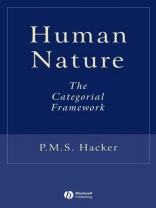This major new study by one of the most penetrating and persistent critics of philosophical and scientific orthodoxy, returns to Aristotle in order to examine the salient categories in terms of which we think about ourselves and our nature, and the distinctive forms of explanation we invoke to render ourselves intelligible to ourselves.
- The culmination of 40 years of thought on the philosophy of mind and the nature of the mankind
- Written by one of the world’s leading philosophers, the co-author of the monumental 4 volume Analytical Commentary on the Philosophical Investigations (Blackwell Publishing, 1980-2004)
- Uses broad categories, such as substance, causation, agency and power to examine how we think about ourselves and our nature
- Platonic and Aristotelian conceptions of human nature are sketched and contrasted
- Individual chapters clarify and provide an historical overview of a specific concept, then link the concept to ideas contained in other chapters
Spis treści
Preface.
Chapter 1 The Project.
1. Human nature.
2. Philosophical anthropology.
3. Grammatical investigation.
4. Philosophical investigation.
5. Philosophy and 'mere words’.
6. A challenge to the autonomy of the philosophical enterprise: Quine.
7. The Platonic and Aristotelian traditions in philosophical anthropology.
Chapter 2 Substance.
1. Substances: things.
2. Substances: stuffs.
3. Substance-referring expressions.
4. Conceptual connections between things and stuffs.
5. Substances and their substantial parts.
6. Substances conceived as natural kinds.
7. Substances conceived as a common logico-linguistic category.
8. A historical digression: misconceptions of the category of substance.
Chapter 3 Causation.
1. Causation: Humean, neo-Humean and anti-Humean.
2. On causal necessity.
3. Event causation is not a prototype.
4. The inadequacy of Hume’s analysis: observability, spatio-temporal relations and regularity.
5. The flaw in the early modern debate.
6. Agent causation as prototype.
7. Agent causation is only a prototype.
8. Event causation and other centres of variation.
9. Overview.
Chapter 4 Powers.
1. Possibility.
2. Powers of the inanimate.
3. Active and passive powers of the inanimate.
4. Power and its actualization.
5. Power and its vehicle.
6. First- and second-order powers; loss of power.
7. Human powers: basic distinctions.
8. Human powers: further distinctions.
9. Dispositions.
Chapter 5 Agency.
1. Inanimate agents.
2. Inanimate needs.
3. Animate agents: needs and wants.
4. Volitional agency: preliminaries.
5. Doings, acts and actions.
6. Human agency and action.
7. A historical overview.
8. Human action as agential causation of movement.
Chapter 6 Teleology and Teleological Explanation.
1. Teleology and purpose.
2. What things have a purpose?
3. Purpose and axiology.
4. The beneficial.
5. A historical digression: teleology and causality.
Chapter 7 Reasons and Explanation of Human Action.
1. Rationality and reasonableness.
2. Reason, reasoning and reasons.
3. Explaining human behaviour.
4. Explanation in terms of agential reasons.
5. Causal mythologies.
Chapter 8 The Mind.
1. Homo loquens.
2. The Cartesian mind.
3. The nature of the mind.
Chapter 9 The Self and the Body.
1. The emergence of the philosophers’ self.
2. The illusion of the philosophers’ self.
3. The body.
4. The relationship between human beings and their bodies.
Chapter 10 The Person.
1. The emergence of the concept.
2. An unholy trinity: Descartes, Locke and Hume.
3. Changing bodies and switching brains: puzzle cases and red herrings.
4. The concept of a person.
Index.
O autorze
P. M. S. Hacker is the leading authority on the philosophy of Wittgenstein. He is author of the four-volume
Analytical Commentary on the Philosophical Investigations, the first two volumes co-authored with G. P. Baker (Blackwell, 1980–96) and of
Wittgenstein’s Place in Twentieth-century Analytic Philosophy (Blackwell, 1996). He has also written extensively on philosophy of language and philosophy of mind, most recently
Philosophical Foundations of Neuroscience (Blackwell, 2003) and
History of Cognitive Neuroscience (Wiley-Blackwell, 2008), both co-authored with M. R. Bennett. He is also co-editor (with Joachim Schulte) and co-translator of the 4th edition of
Wittgenstein’s Philosophical Investigations (Wiley-Blackwell, 2009).












